Occupy West Coast Ports, December 12: A Day of Protest Against Goldman Sachs

NEWS JUNKIE POST
Dec 10, 2011 at 1:52 amA News Junkie Post Exclusive with an interview of Occupy LA organizer Michael Novick by NJP’s Gilbert Mercier.
On December 12, the Occupy movement will try to shut down all the major ports along the West Coast. This coordinated ambitious action will take place in San Diego, Los Angeles, Oakland, Seattle and even in Vancouver, British Colombia. A question remains: will the port workers and truck drivers be receptive and participate in the shut down action or will they listen to their union bosses and oppose it?
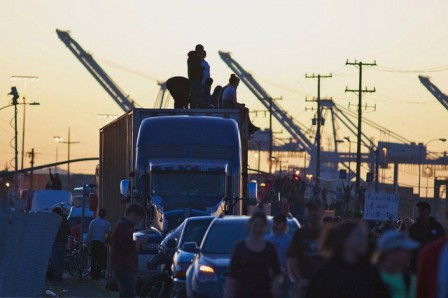 Among the Occupy movement activists behind the bold action is Scott Olsen from Oakland, California. In an effort to rally the port workers behind the shut down, Olsen and other Occupy activists are working diligently on getting support from the unions. “You do the work, and THEY, the global maritime bosses, profit at your expense. Your safety and your jobs are always at stake,” said Olsen, who was seriously injured by police during his participation in Occupy Oakland, in a statement to ILWU members. The December 12 action by the Occupy movement is a critical attempt to get workers on their side. A lot of union members are receptive to the Occupy message.
Among the Occupy movement activists behind the bold action is Scott Olsen from Oakland, California. In an effort to rally the port workers behind the shut down, Olsen and other Occupy activists are working diligently on getting support from the unions. “You do the work, and THEY, the global maritime bosses, profit at your expense. Your safety and your jobs are always at stake,” said Olsen, who was seriously injured by police during his participation in Occupy Oakland, in a statement to ILWU members. The December 12 action by the Occupy movement is a critical attempt to get workers on their side. A lot of union members are receptive to the Occupy message.
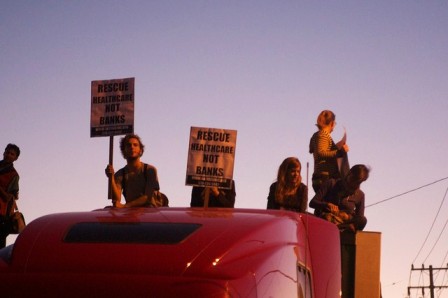 “For the first time in decades in this country, the labor movement is being confronted with a genuine movement from below, a populist movement that is challenging the very fundamentals of our capitalist system. Occupy is resonating very deeply with the ranks of labor,” said Jack Heyman, a retired member of ILWU local 10, who is fully on board with the December 12 shut down effort.
“For the first time in decades in this country, the labor movement is being confronted with a genuine movement from below, a populist movement that is challenging the very fundamentals of our capitalist system. Occupy is resonating very deeply with the ranks of labor,” said Jack Heyman, a retired member of ILWU local 10, who is fully on board with the December 12 shut down effort.
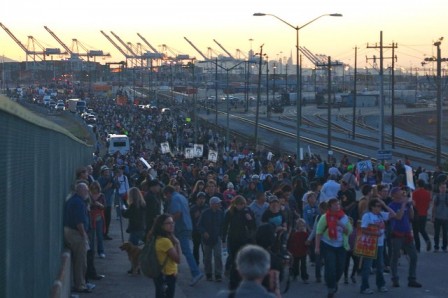 However, at the top of the ILWU, president Robert McEllrath is clearly putting his foot on the break on a worker participation in the December 12 shut down. “Only ILWU members or their elected representatives can authorize job actions on behalf of the union, and any decisions made by groups outside of the union’s democratic process do not hold water, regardless of the intent,” said McEllrath.
However, at the top of the ILWU, president Robert McEllrath is clearly putting his foot on the break on a worker participation in the December 12 shut down. “Only ILWU members or their elected representatives can authorize job actions on behalf of the union, and any decisions made by groups outside of the union’s democratic process do not hold water, regardless of the intent,” said McEllrath.
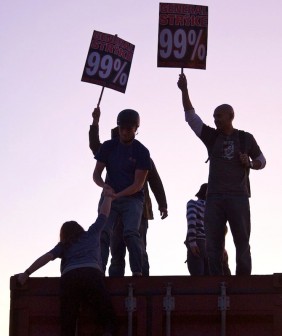 The idea of the December 12 shut down the ports action came from Occupy Los Angeles. The Occupy LA group decided to focus their protest on SSA Marine. SSA Marine is a terminal worldwide operator, and it is owned by Goldman Sachs. Michael Novick, a retired LA teacher, says that SSA Marine is notorious for anti-labor practices toward port workers and truckers worldwide. Novick understands that the Occupy movement initiative of December 12 is not a substitution for the role of the ILWU. “We understand they (the ILWU) have limits on what actions they can take. We can’t put ourselves forward as representing them. But we can represent the issues and the interests of the 99 percent,” said Novick. The retired teacher says that the action is taken “in solidarity with port workers, including the port truck drivers”.
The idea of the December 12 shut down the ports action came from Occupy Los Angeles. The Occupy LA group decided to focus their protest on SSA Marine. SSA Marine is a terminal worldwide operator, and it is owned by Goldman Sachs. Michael Novick, a retired LA teacher, says that SSA Marine is notorious for anti-labor practices toward port workers and truckers worldwide. Novick understands that the Occupy movement initiative of December 12 is not a substitution for the role of the ILWU. “We understand they (the ILWU) have limits on what actions they can take. We can’t put ourselves forward as representing them. But we can represent the issues and the interests of the 99 percent,” said Novick. The retired teacher says that the action is taken “in solidarity with port workers, including the port truck drivers”.
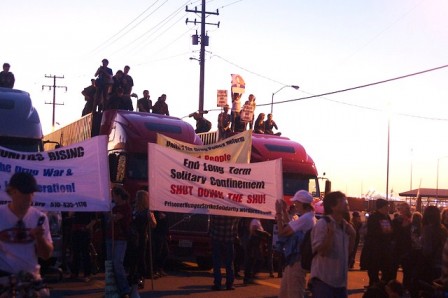 Novick also explains that the focus is on shutting down SSA Marine for a day, because it is a global company owned by investment bank Goldman Sachs. As such, it is a symbol of the corporate greed that is ruining the lives of the 99 percent. Goldman Sachs, the parent company of SSA Marine, received billions of dollars in federal bail-out money during the financial crisis of 2008. SSA Marine is also a leading military contractor which ran Iraq’s port during the US occupation of the country. Novick stresses that Occupy LA is working independently from the unions, but what Michael Novick and others Occupy movement activists are working on is a build up for a general strike on May, 1 2012.
Novick also explains that the focus is on shutting down SSA Marine for a day, because it is a global company owned by investment bank Goldman Sachs. As such, it is a symbol of the corporate greed that is ruining the lives of the 99 percent. Goldman Sachs, the parent company of SSA Marine, received billions of dollars in federal bail-out money during the financial crisis of 2008. SSA Marine is also a leading military contractor which ran Iraq’s port during the US occupation of the country. Novick stresses that Occupy LA is working independently from the unions, but what Michael Novick and others Occupy movement activists are working on is a build up for a general strike on May, 1 2012.
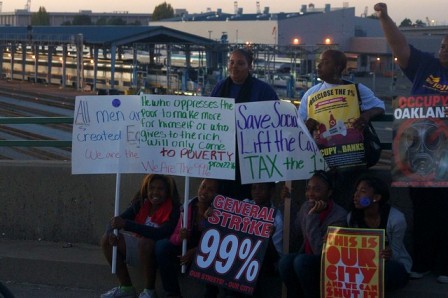 “We are demanding economic justice for all. The 1 percent have pursued conscious policies of globalization, de-industrialization of the United States, capital flight and super-exploitation of workers in other countries. We are building towards a general strike by organized and unorganized workers as a path of direct action by working people and the 99 percent to define and protect our own interests. Only the working people of the ports, drivers, long-shore, warehouse, clerks and others have the power to do that(shut down the ports). That is why we see this as only a first step toward a general strike on May, 1 2012. And we invite all of organized and unorganized labor and all communities to join in building towards that goal,” stated the General Strike Committee of Occupy Los Angeles.
“We are demanding economic justice for all. The 1 percent have pursued conscious policies of globalization, de-industrialization of the United States, capital flight and super-exploitation of workers in other countries. We are building towards a general strike by organized and unorganized workers as a path of direct action by working people and the 99 percent to define and protect our own interests. Only the working people of the ports, drivers, long-shore, warehouse, clerks and others have the power to do that(shut down the ports). That is why we see this as only a first step toward a general strike on May, 1 2012. And we invite all of organized and unorganized labor and all communities to join in building towards that goal,” stated the General Strike Committee of Occupy Los Angeles.
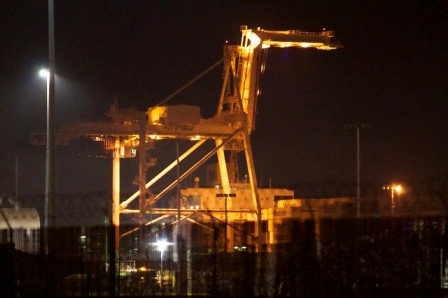 Michael Novick elaborated on what he views as the strategy of the December 12 action, and the overall Occupy movement in an exclusive interview with NJP’s editor in chief Gilbert Mercier.
Michael Novick elaborated on what he views as the strategy of the December 12 action, and the overall Occupy movement in an exclusive interview with NJP’s editor in chief Gilbert Mercier.
Do you think that a majority of the ILWU membership will backup December 12 shut down?
Michael Novick: “We are focusing on one or more SSA Marine facilities. It is possible that ILWU members of those particular terminals will be allowed by the arbitrator to honor the community picket. The Ports of Los Angeles and Long Beach together handle 80 percent of the tonnage on the West Coast, and dwarf all the other ports combined, probably 25 miles or more of waterfront, with multiple roads, highway bridges and rail connections. It is nearly impossible to chose with mass popular protest, and has only be closed in the past by industrial actions-either the ILWU striking(a long time ago) or by the port truck drivers( who are the main not unionized workers, because they are considered independent contractors so the shipping and trucking companies can “sweat them”. The port drivers closed the ports twice in the past decade, and once the Harbor Commission closed the port of Los Angeles for fear of a truck drivers action.”
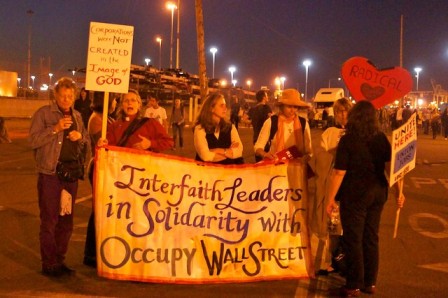 What do you hope to achieve by the action you are promoting?
What do you hope to achieve by the action you are promoting?
We want to expose “Wall Street on the Waterfront”. How the 1 percent, particularly Goldman Sachs/ SSA Marine, enrich themselves at everyone else expense, and at the expense of workers’ rights, the environment, and the community. SSA Marine is a war profiteer, treats port truck drivers as “contractors” to avoid paying taxes, benefits, workers compensation or decent wages. They represent deindustrialization, capital flight and super-exploitation of workers in other countries that has resulted in a highly distorted global economy. We want fair trade, equity and good jobs for all.
 Do you think that the Occupy movement can remain without a clearly define leadership?
Do you think that the Occupy movement can remain without a clearly define leadership?
Occupy has developed methods of communication and accountability that do not rely on hierarchical relationships. This doesn’t mean that particular people don’t step forward and work to make sure actions take place, just that we don’t elevate them over other people and we make decisions by transparent, participatory consensus methods, not diktat.
Should the Occupy movement define itself as a political force and how can this be accomplished?
The Occupy movement is a political force, but not in the electoral sense. The December 12 ports action was proposed as a first step towards a general strike, and has caught on up and down the West Coast and the Gulf Coast. Occupy Wall Street in New-York is carrying out a solidarity action at Goldman Sachs’ headquarter, and the question of a general strike is now being discussed all around the country as a method of direct action by organized and unorganized working people and other sectors of the 99 percent to protect our economic interests and defend real democracy against repression and the hollowing out of representational methods like legislatures.
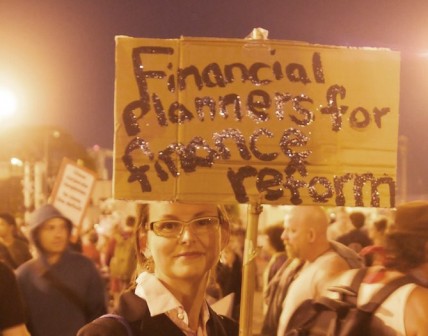 The Occupy movement is global. How do you think the different parts of this huge and complex puzzle can collaborate in their goal to challenge the 1 percent controlling most resources, the financial system and real political power?
The Occupy movement is global. How do you think the different parts of this huge and complex puzzle can collaborate in their goal to challenge the 1 percent controlling most resources, the financial system and real political power?
The power and wealth of the 1 percent is not innate in them. It flows from the people they oppress and exploit. As the 99 percent begin to withhold our consent, begin to break our identification with the oppressors and reject their power over us, it begins to create possibility of real solidarity, of fighting together against a common enemy on the basis of self-determination, mutual aid and free association.
What do you think is the best strategy for the 99 percent to apply in order to get social justice and finally their fair share of the pie?
We have to build a new bakery, so to speak. We are not fighting over crumbs, from the table of the wealthy and powerful. We need to envision an economy and politics based on human needs and desires, on freedom and equality. We don’t want a share of the pie that the 1 percent have cooked up to benefit themselves.
Editor’s Note: All photographs by Brian Sims.
Related Articles
- February 8, 2012 Will Occupy Choose Super-PAC Funding Over Radical Action?
- November 23, 2012 Occupy Strategy: Global Strike and Consumer Boycott Should Be on the Agenda
- January 28, 2012 The Occupy Movement And Those That Would Love It To Death
- December 17, 2011 Growing Pains: When Hate and Exclusion Occupy
- January 5, 2012 May Day 2012 and the Indian Spring: A Day Without America’s Outsourced Jobs?
- February 27, 2012 American Spring: Where Does Occupy Go from Here?

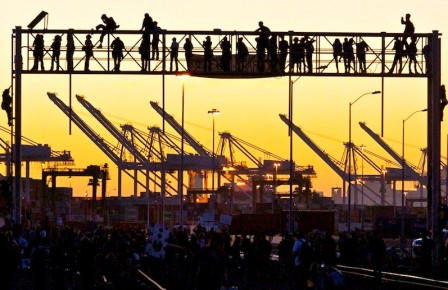











You must be logged in to post a comment Login